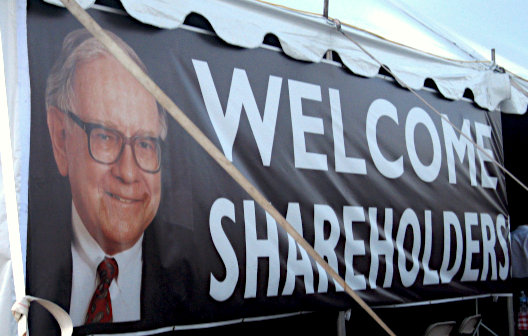Image: BuffettNews.com
Berkshire Hathaway’s Annual Report Highlights Pros and Cons of Investing in a Giant
There were a few surprises in Warren Buffett’s annual letter to shareholders released Saturday, the least of these will probably garner a good deal of attention at the Berkshire Hathaway Shareholder Meeting. As announced by Mr. Buffett in the letter, “’Cousin” Jimmy Buffett has designed a pontoon “party” boat that is now being manufactured by Forest River, a Berkshire subsidiary. The boat will be introduced on April 29 at our Berkshire Bazaar of Bargains. And, for two days only, shareholders will be able to purchase Jimmy’s masterpiece at a 10% discount. Your bargain-hunting chairman will be buying a boat for his family’s use. Join me.” Other, more critical but less fun surprises are covered below.
Impact of interest Rates on Berkshire
Berkshire’s balance sheet includes $144 billion of cash and cash equivalents. Of this sum, $120 billion is held in U.S. Treasury bills. US T-bills are structured to mature in one year or less. At least two things are worth noting from this. First, T-bills as of February 25th are yielding from .03% in a one-month maturity, to 1.13% out a full year. Most expect the Fed to tighten during 2022, with some forecasters expecting as many as eight 25bp to 50bp (0.25% to 0.50%) increases each. If the Fed does tighten by only 25bp eight times it will likely serve to raise the T-bill curve levels up 2% or more. A 2% increase on the “risk free” rate would add $2.4 billion to Berkshires bottom line. In 2021 Berkshire Hathaway reported revenue of $90 billion. The interest rate hike would be meaningful to the companies earnings. The other interesting fact worth paying attention to is that the amount Berkshire Hathaway owns in U.S. Treasuries is equal to 0.50% of the publicly held national debt of the U.S. If Berkshire should go on a buying spree and not roll their maturing T-bills, this by itself could cause upward pressure on U.S. interest rates.
The CEO’s letter to shareholders made clear that, although they have committed to holding $30 billion in cash, they would prefer not to have as much excess cash available as they do. There is also a concern when looking to invest in public entities that interest rates that are low push the prices of all productive investments upward, whether these are stocks, real estate, farms, oil wells, etc.. Buffett writes, “Other factors influence valuations as well, but interest rates will always be important.”
Why Not Repurchase Shares?
Buffett explains there are three ways to increase investor value. First and most important is to increase the long-term earning power of Berkshire’s controlled businesses through internal growth or by making acquisitions. Currently, internal opportunities deliver better returns than acquisitions. Berkshire’s resources are far greater than available opportunities. The second method is buying stock in good companies. While there are times when there are many attractive opportunities, Buffett writes, “Today, though, we find little that excites us.”
So, if Berkshire Hathaway is such a good investment, why not repurchase shares and allow the company to multiply its benefit to itself? In answering this question, Buffett says about share repurchase, “Through that simple act, we increase your share of the many controlled and non-controlled businesses Berkshire owns. When the price/value equation is right, this path is the easiest and most certain way for us to increase your wealth.” During the past two years, Berkshire did repurchase 9% of their outstanding shares. Buffett says, “I want to underscore that for Berkshire repurchases to make sense, our shares must offer appropriate value. We don’t want to overpay for the shares of other companies, and it would be value-destroying if we were to overpay when we are buying Berkshire.”
Take-Away
The success of Berkshire Hathaway and the “Oracle of Omaha” that remains at the helm are worth watching if you’re an investor at any level. In addition to the decades of success, there is another story of big versus small or even young versus old. It’s the story of a company too large to efficiently benefit from its success. While their decision-making capacity may be second to none, much of their massive “firepower” remains underutilized. This makes Berkshire Hathaway worth considering as a core long-term holding in much the same way one invests in a large balanced mutual fund focused on stable growth. Investors that seek companies with maximum efficiency and capital deployment with far more growth potential should consider allocating at least a portion of their investments to smaller well researched companies. The data and research within Channelchek focus exclusively on small and microcap companies that aren’t burdened by billions in underperforming assets. Sign-up for daily emails and access to top-tier research.
Managing Editor, Channelchek
Suggested Reading
 It’s Officially Warren Buffett Season – Hints on What to Expect
|
 Long Term Retirement Money and Fledgling Companies
|
 Is GDP Growth Transitory and Inflation Persistent?
|
 Why Goldman Says to Buy the Dip
|
Sources
https://datalab.usaspending.gov/americas-finance-guide/#_blank
https://www.forestriverinc.com/Our-Products/Pontoon-Boats
Stay up to date. Follow us:

|


